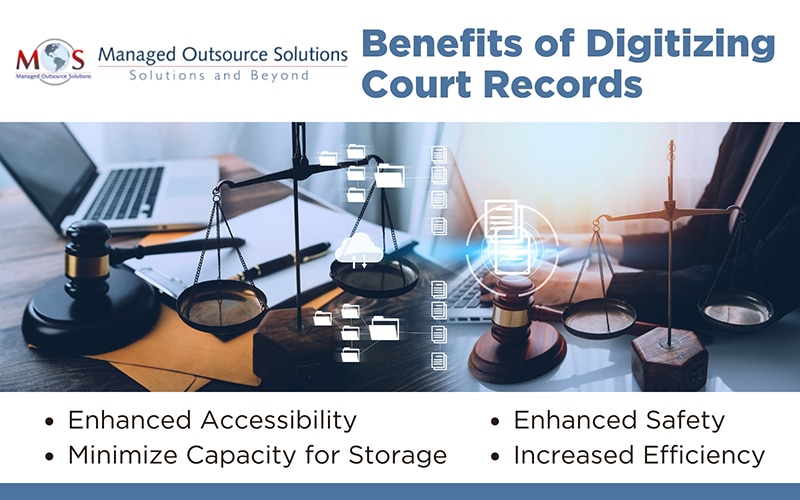Proper document management is crucial for any organization to function more efficiently and effectively. This is all the more important when it comes to court records and documents. Digitizing court documents optimizes efficiency and enables courts to operate more smoothly while upholding procedural integrity and transparency. It is also necessary to efficiently manage the exponential growth in the volume of court records. Historic court records have exceptional evidential, informational, and intrinsic value and digitization protects the critical information from the threat of loss or damage. Today, document conversion services are playing a key role in the digitization of court records.

Advantages of Digitizing Court Records
- Enhanced Accessibility: Regardless of how well-organized your physical document storage and retrieval procedures are, moving to a well-designed digital document management system will significantly enhance accessibility to your files. With digital documents, you can identify the files you need a matter of minutes, store records efficiently, establish a common naming convention, and distribute them. Digitizing court documents can also facilitate the quicker and easier use of crucial metadata and information by other organizations, government agencies, and other platforms. For instance, it will make it easier for local police departments to develop a portal feature that allows people to look up outstanding warrants, citations, and fines on their website.
- Saves Space: Digitizing court records saves considerable storage space. The main type of record the federal courts create and maintain is a case file containing a docket sheet and all documents filed in a case. With thousands of law suits filed every year, this can add up mountains of paper files, resulting in court record rooms crammed with endless rows of filing cabinets or boxes. Moreover, Physical record keeping calls for full-time assistance and someone must be always available to retrieve the files. Digitizing the records reduce the amount of storage space needed to store them and allows users to retrieve information quickly and easily.
- Enhanced Safety: Digitization enhancing record accessibility without compromising security. It is the responsibility of the court to make sure that the security of legal and court documents is maintained. It is imperative to ensure that only authorized individuals receive documents containing confidential data. It can be challenging to preserve paper documents with absolute confidence. Despite the best efforts, hard copies of papers might be mislabeled, filed wrongly, or misplaced. They are also exposed to damage and destruction in the event of floods or fires. On the other hand, digital records are far more secure—and not simply against loss or damage. They can be structured with permissions to guarantee that only authorized users can access them. They can also be used for auditing, which enables clerks or records custodians to keep track of who has viewed, accessed, or modified a particular document, when, and from where.
- Increased Efficiency: By converting paper-based documents into electronic format, courts can streamline their workflows, reduce paperwork, and expedite case processing times. Digital records are easily searchable, allowing judges, lawyers, and other legal professionals to access information quickly and accurately. Ease of access to organized and comprehensive data not only speeds up proceedings but also improves the overall quality of decision-making. Furthermore, digitization facilitates remote access, enabling stakeholders to work from anywhere, increasing flexibility, responsiveness, and transparency.
Napa County Superior Court, California is an example of a court that has gone digital with the aim to establish a complete document management solution. The court accumulated an archive of 800,000 documents in case files over time. As the court records repository expanded, it was constantly faced with the challenge of enabling attorneys to perform research swiftly. Napa turned to digitization services to convert all records into digital format in an effort to fulfill its mission of providing efficient public services. This not only addressed research needs, but also provided efficiency gains within daily court operations and case management.
Digitize your new and archived records and take document management to the next level!
If you have a large volume of records to digitize, the practical approach would be to partner with a document conversion company. Professional companies are equipped with the latest advanced technology and techniques and have an expert team to handle bulk document scanning and conversion.




